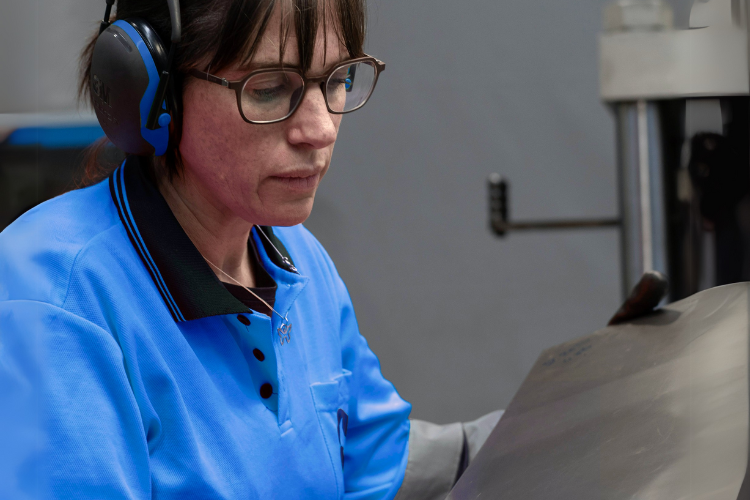Equality and competitiveness in industry: ARANIA’s commitment to diversity
The pursuit of gender equality is reshaping the industrial landscape, transcending ethical considerations to become a strategic imperative. The promotion of diversity enhances organisational performance by improving workplace dynamics, accelerating innovation and bolstering competitiveness. A study conducted by Grupo SPRI underscores this impact, identifying ARANIA, a leader in the Spanish cold-rolled steel industry, as a prime example of how inclusive policies contribute to long-term sustainability and industrial consolidation.
The correlation between gender equality and competitiveness is becoming increasingly relevant in long-term industrial growth strategies, particularly in traditionally male-dominated sectors such as the steel industry. Grupo SPRI, the Basque Business Development Agency, has conducted a comprehensive study on the impact of gender equality on industrial competitiveness, analysing 474 companies in the Basque Country and 76 firms across 20 European countries. The results are compelling: firms that have actively implemented policies to reduce the gender gap demonstrate superior performance in revenue growth, job creation, and innovation capacity.
As highlighted in this study presented at the World Manufacturing Forum 2024 , gender equality is a key driver of competitiveness, particularly in international expansion and technological breakthroughs. The research establishes a direct link between workforce diversity and innovation, confirming that inclusive teams foster more creative and efficient solutions. The active participation of women in strategic roles not only enhances decision-making processes but also reduces systemic biases, ensuring a more balanced and forward-looking corporate strategy.
We should point out that ARANIA ranks among the highest-rated companies in the study carried out by Grupo SPRI, both in the equality index and in the competitiveness rating. These results are not a coincidence, but rather the consequence of the company’s strategic and comprehensive commitment to gender equality.
As previously announced on our blog, ARANIA has reinforced its commitment to gender equality since early 2023 through the establishment of the Equality Commission, a key driver of organisational change. This internal committee has been instrumental in designing and executing a robust Equality Plan, establishing concrete goals and a structured action framework to ensure fairness and inclusion throughout the organisation. As Leire Barayazarra, ARANIA’s Management Systems Director, states, “this process acted as an eye-opener that generated surprise, but not controversy”.
By taking concrete and sustainable measures , the company has made significant progress in terms of parity within its technical and management teams, establishing a solid foundation for broader industry transformation. A clear indicator of this progress is the evolution of the Management Committee, where female representation has increased from 10% a decade ago to 30% today, signalling a decisive shift towards a more inclusive leadership model.
However, the company still faces significant challenges, especially on its production site, where the presence of women still stands at just 1%, significantly lower than the industry sector average of around 19%. This underrepresentation is largely attributed to long-standing structural and cultural biases that associate these roles with physical endurance. In order to address this disparity, ARANIA has implemented targeted strategies aimed at dismantling these obstacles and fostering greater diversity across all areas of the company.
One of ARANIA’s most impactful initiatives has been the implementation of equality training programs across all organisational levels. These initiatives have facilitated the detection of structural barriers, thus enabling the removal of implicit biases that once constrained women’s access to leadership and technical positions.
Simultaneously, the company has initiated an ambitious ergonomic optimisation project focused of industrial machinery and working equimpent, to ensure that all employees can perform their tasks without limitations in the future, regardless of age, gender, or physical strength. Beyond fostering gender inclusivity in production, this initiative contributes to safer working conditions and enhanced operational performance.
Another essential strategy is ARANIA’s commitment to diversity in recruitment processes. The HR team actively promotes gender balance by prioritising the hiring of women in traditionally male-dominated departments (and vice versa), thus fostering diversity as a key driver of team performance and competitiveness.
Additionally, ARANIA actively promotes female role models in the industry by participating in initiatives such as INDUSTRIA ERRONKA, a project designed and promoted by FVEM, the Biscayan Federation of Metal Companies. This programme aims to connect industry to young students and encourage interest in STEM fields (Science, Technology, Engineering, and Mathematics), where female representation remains low.
The study conducted by Grupo SPRI has identified three essential drivers to increase the presence of women in the industry: access, development and leadership.
Access: Ensuring greater female inclusion in the industry requires dismantling existing barriers. The underrepresentation of women in STEM education remains a major limitation. To counter this trend, it is imperative to encourage scientific and technical careers among girls from an early stage.
Development: After entering the industry space, women must be provided with real opportunities for professional growth. Equality training, work-life balance policies, and the eradication of bias in job promotion are critical measures for fostering an inclusive and equitable work environment.
Leadership: The presence of women in management boards within the industrial sector is still limited. Key drivers of progress in this area include the implementation of mentoring programs, the setting of diversity targets for strategic roles, and the development of inclusive leadership models to foster an equitable workplace.
Moving forward, the priority is to strengthen these policies and foster knowledge exchange among industry players. This will highlight that gender equality is not just a feasible aspiration, but a fundamental pillar of long-term competitiveness and innovation in the industrial sector.
“Without a commitment to equality, our company would be less diverse and less competitive”. — Juan Ramis, Managing Director at ARANIA.
Far from being a superficial concern or regulatory mandate, gender equality is a decisive factor in enhancing industrial competitiveness and ensuring long-term sustainability for our steel sector. Forward-thinking companies understand that embracing diversity not only reinforces their market presence but also improves talent management and stimulates innovation, while driving overall efficiency. The steel industry is evolving towards a more inclusive and balanced model, with ARANIA at the forefront of this paradigm shift.
